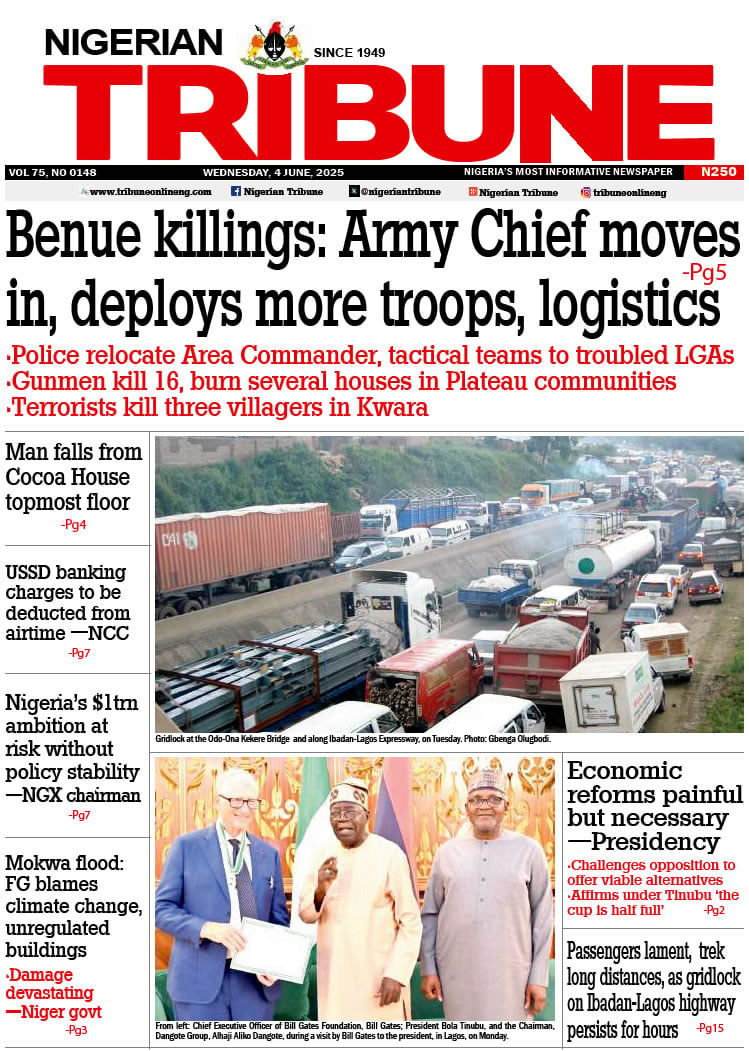Former Chief of Army Staff, (COAS), Lt. Gen. T.Y Buratai rtd, has hailed the economic policies of President Bola Ahmed Tinubu as he marked his second anniversary in office.
Gen Buratai, who spoke at the Timelineng lecture titled, ‘Importance of the media in information gathering, disclosure in the face of security challenges, the achievements of Tinubu and others barriers’, held in Lagos yesterday, said that the administration of Tinubu has done well giving the economic indices.
ALSO READ: Midterm: Security expert lauds Tinubu, NSA on security, devt
Though Gen Buratai said there’s room for improvement, he said the thematic approach embarked upon during the recent summit at the Presidential Villa, Abuja, remains the best.
He, however, urged the governors to do more in terms of securing their domain, adding that the Constitution does not preclude them from performing such a task.
On media reportage and security, Buratai explained that there is a need for a smooth working relationship in order not to jeopardise the national security and sovereignty of Nigeria.
He said: ” As we have explored, President Bola Ahmed Tinubu’s achievements highlight a commitment to transparency and accountability, yet they also underscore the barriers that persist in fostering an environment conducive to free expression. The media serves not only as a watchdog but also as a bridge between the government and the populace, ensuring that citizens remain informed and engaged.
“It is imperative for both state actors and civil society to recognize that a robust media landscape is essential for democracy; it empowers individuals with knowledge while holding power to account.
“In navigating these complex dynamics, we must champion the freedom of the press as an ally in our collective pursuit of security and justice.
“The media are a critical institution in promoting peace and democratic governance. Careful dissemination of information enables the public to make sound decisions.
“Responsible journalism fosters political stability and national security. Nevertheless, irresponsible journalism can turn into a deadly monster that takes lives, destroys property, weakens economies, and channels human and disenfranchised grievances in myriad destructive ways.
“Silencing the media for national security imperatives can create a space for the media to act irresponsibly. Maintaining a balance between undiluted human rights imperatives and genuine national security considerations in contrast to hypocrisy and spinning lies, is a formidable challenge.
“As then COAS, I maintained a robust relationship with the media, between July 2015 and January 2021, the Nigerian Army embedded journalists during operational tours of the COAS. There were regular press briefings and media engagements.
“I initiated the NA social media dialogue, which is still being conducted on a quarterly basis among other initiatives.”
On why Nigerian governors should do more, Buratai added, “The Nigerian constitution does not prevent state governors from securing their states and the people. In fact, the constitution grants them significant autonomy in decision-making, including matters of security and governance. While the federal government holds ultimate power over the police and the military, the state governors are empowered to manage and coordinate security efforts within their states.
The constitution recognises the 36 states and their respective governors as having substantial independence in managing state affairs, including security.
“The 1999 Nigerian constitution (as amended) grants state governments a significant degree of autonomy, primarily outlined in sections 4(7) and 7(1).
“State governors are responsible for maintaining peace and order within their states, coordinating with federal security forces as needed. The Nigerian Constitution outlines state government security responsibilities primarily through Section 11 concerning public order and public security, and Section 215 regarding the role of the Nigerian Police Force.
“While the Constitution passively designate state governors as “Chief Security Officers,” it grants them authority to direct the Commissioner of Police within their state, subject to potential federal oversight.
While the police are a federal agency, states can establish their own security agencies and work with federal authorities to maintain security. Fortunately, the National Assembly is currently considering the creation of the State Police in the constitution.
The constitution encourages cooperation between state and federal governments on security matters, with the state governors playing a key role in coordinating efforts within their jurisdictions.
The 1999 Nigerian Constitution outlines provisions for cooperation and coordination between state governments, primarily focusing on financial matters and the establishment and functioning of local government councils. Specifically, Sections 7 and 162 address these aspects.
It is in this regard that I call on all the state governors across the country to review their security strategy and take the bull by the horns to ensure the security of their states. There is no amount of funds spent on saving a life is wasted. The indigenes must exist first before consideration of other essentials of living. The state governments must invest in technology, human resource development, education, empowerment and road infrastructure in order to enhance security.”
ALSO READ FROM NIGERIAN TRIBUNE






